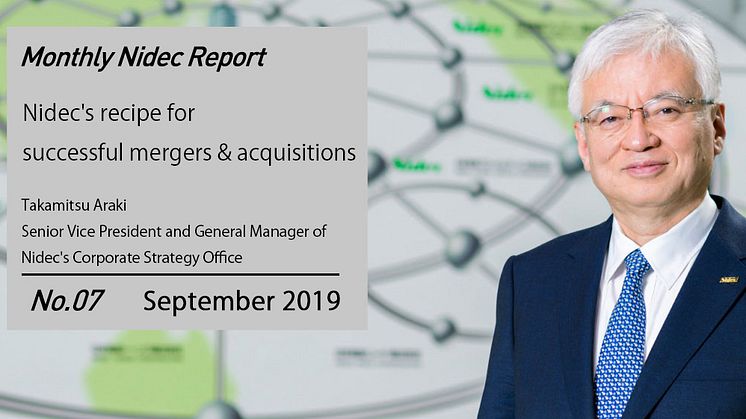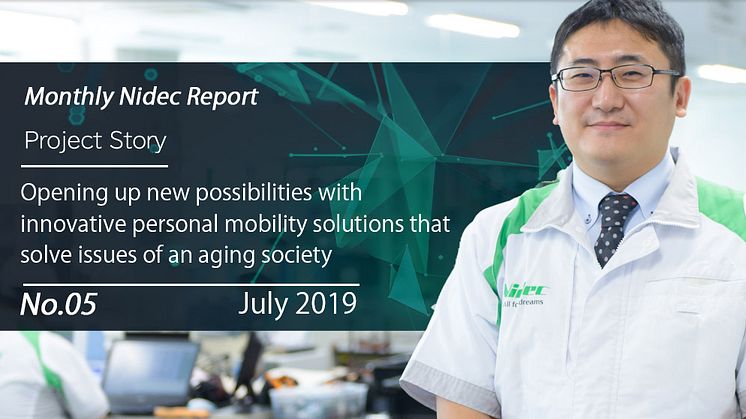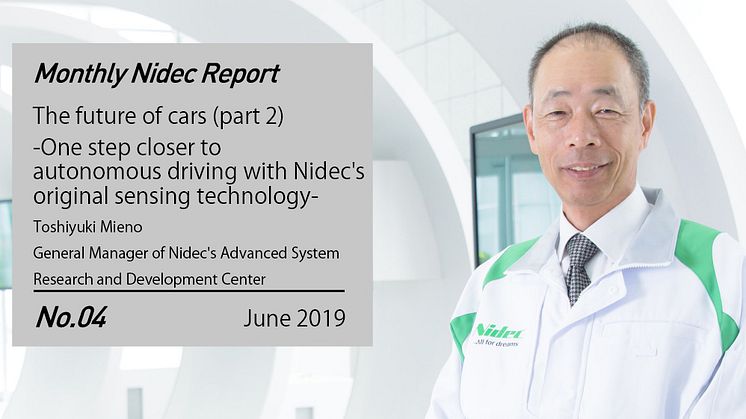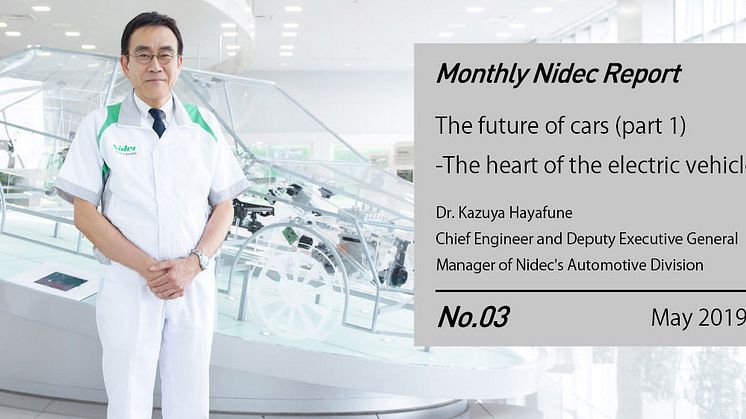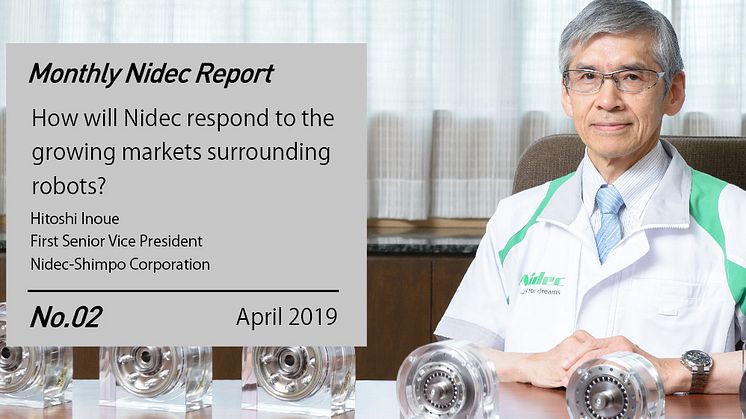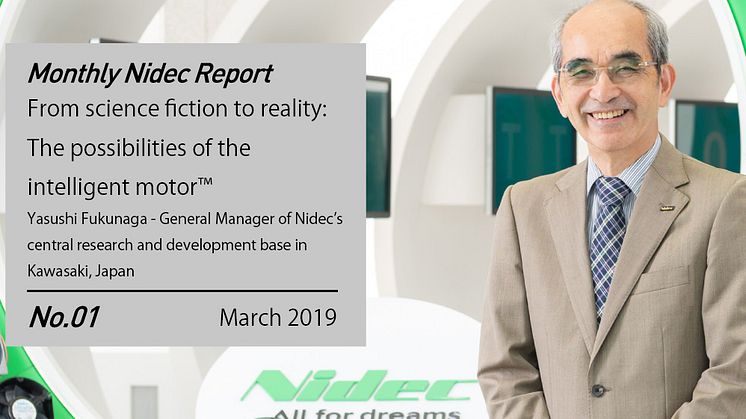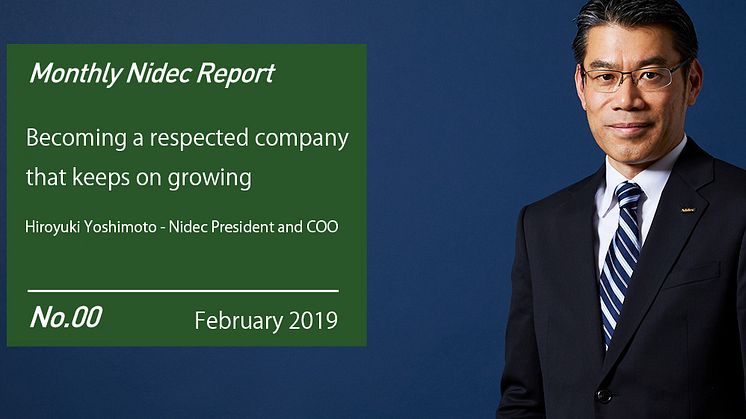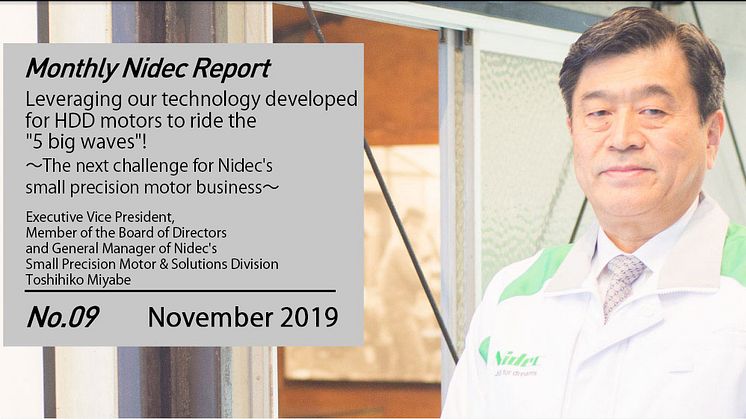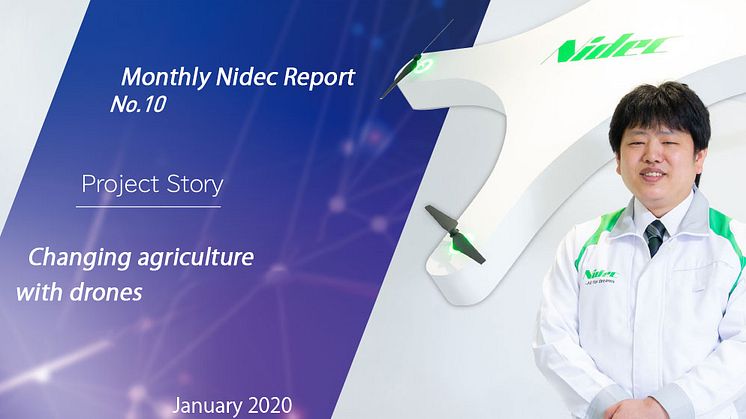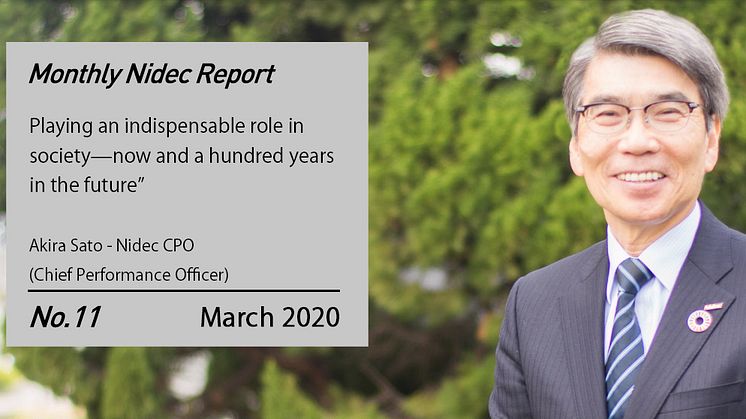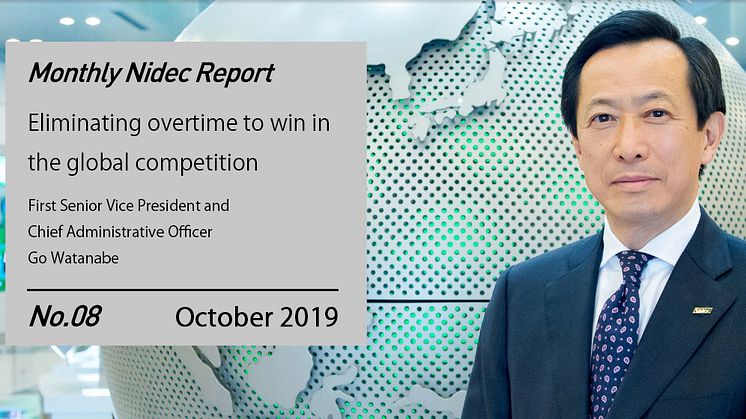
Blog post -
Monthly Nidec Report - Eliminating overtime to win in the global competition
Driven by a need to address the declining working-age population brought about by a decreasing birthrate in Japan, the work-style reform initiative launched by the Japanese government is gaining traction in industrial circles. For Nidec, a company that used to be known for long hours and a gung-ho attitude, the shift toward a more efficient way of working started about three years ago. In order to win in the global competition, the company has set out to achieve "double productivity and zero overtime" by 2020.
A reform with the aim of increasing competitiveness and achieving 10 trillion yen in sales
- What is the context behind Nidec's decision to launch their own work-style reform?
Nidec was founded in 1973 by four engineers: Shigenobu Nagamori and his three companions. Starting out as a small business making motors in a shed, the company had little to no material assets to rely on. Nidec's competitors, on the other hand, were large-scale enterprises with talented workforces, vast financial power and advanced equipment. Pondering how he could compete with these established manufacturers, Mr. Nagamori came to the realization that there was one resource that was afforded equally to all companies regardless of their size: time. Thus, he made the decision to work twice as many hours as his competitors. His hard work paid off as his company continued to grow at a rapid pace. Nidec was quick to pursue M&A as a means of accelerating growth, making its first acquisitions just a couple of years after the company was founded. In the 2010s the company engaged in an active campaign of overseas acquisitions with the goal of becoming "the world's No. 1 comprehensive motor manufacturer." Up until that point, Nidec had relied on its ethos of working longer hours than its competitors to produce results. However, we realized that this would not be a sustainable strategy in the long term; in order to succeed in the increasingly intensifying global competition we would have to reexamine the way that we work.
It all started when we acquired a number of businesses in Europe and the US and realized that the work cultures of these regions were markedly different from that of Japan. We saw that companies abroad were perfectly capable of producing great results, even though employees would take month-long vacations during the summers and not remain after office hours. Mr. Nagamori turned his mind to the question of why Japanese companies were stuck producing similar, or sometimes even lower, results than their European and American counterparts, even though the average Japanese employee works comparatively longer hours. In terms of labor productivity, Japan ranks in at a low 21 among the 36 OECD countries in a 2017 ranking of average per capita productivity. The conclusion is obvious: if you want to be a competitive global company in an international environment, you have to be as productive as, or even more productive than, European and American companies. This is the context behind our commitment to eliminate overtime by 2020. Reducing overtime is not the goal in itself, it is the means of achieving higher productivity. In other words, if we can double productivity, overtime will disappear naturally as a result.
- Specifically, what kind of measures have you taken to increase productivity?
We started by streamlining meetings. There is a tendency for meetings to take up increasingly more time the higher your position becomes in an organization. Many managers move around from meeting to meeting, rarely returning to their desks and in these situations, subordinates will often have to wait for opportunities to discuss different projects or have documents and reports approved. However, by pushing for shorter meetings—45 minutes instead of an hour, 30 minutes instead of 45—we changed the situation so that managers have time to return to their desks between meetings and tend to such matters.
Of course, that was only the beginning. Our next step was to listen to the opinions of our employees about what issues, in their experience, impact productivity. As we did so, two things became apparent: there was a need to improve both the managerial ability of the middle management and the language proficiency of our employees across the board. Armed with this knowledge, we involved many different departments and employees in group discussions aimed at figuring out how best to solve these problems.
Higher productivity with enhanced managerial ability and better language proficiency

- What is the relation between productivity and managerial ability / language proficiency?
For example, unclear directions or miscommunication due to insufficient managerial abilities can lead to misunderstandings or otherwise make it difficult for subordinates to carry out their duties. Language proficiency is an important factor as Nidec has become a global enterprise with operations in over 40 countries. Less than 10% of all 100,000 employees work in our Japanese offices and factories so being able to communicate proficiently in English over emails and in video conferences is an absolute necessity. Of course, our customers are from all over the world as well, so a strong command of the English language is indispensable when it comes to negotiations and other discussions as well. Overreliance on interpreters and incomplete understanding during negotiations were cited by many of our Japanese employees as major factors negatively affecting productivity.
- What are you doing to overcome these problems?
We have introduced two new training programs designed to strengthen managerial ability. One of them is focused on increasing understanding and penetration of the Nidec Way—Nidec’s code of conduct shared by all employees. The Nidec Way was established in 2015 as a common set of values that allow all employees to work together toward the same goal regardless of national boundaries, cultural backgrounds, language differences and a rapidly changing business environment. It makes our company group stronger and lays the groundwork for our goal of being an excellent company that keeps on growing for 100 years and beyond. The aim of our first new training program is to improve productivity by increasing penetration of the Nidec Way and making sure that it is understood and followed properly by all employees.
The second new training program is a management training course that has been introduced in over two thirds of all Fortune 500 companies. The methods taught in this course, commonly used in European and American companies, emphasize detailed and concrete advice that can be changed based on assessment of abilities and enthusiasm through personalized communication. This results in higher productivity, both for the subordinates and the managers themselves.
- What measures have you taken to encourage improvement of English ability?
All aspiring managers are now required to get a certain score on a standardized test of English language proficiency. The required score will be increased gradually until 2021. However, in order to use English effectively in a business setting we recognize that it is necessary to improve beyond this score, so we have also launched group training programs in which employees with similar scores train together. Future leader candidates, in particular, receive rigorous training by participating in a one-year-program of English presentations and negotiation sessions together with other managers from around the world.
Results? Higher productivity and less overtime

- How are things proceeding? Have you seen any results yet?
According to feedback from the managers who participate in the training programs, many participants feel like they have gained a better understanding of how to communicate with, and lead, their team members. Many employees also express their opinion that the way that their managers communicate with them has improved, so I would definitely say that we are seeing favorable results. More and more employees receive high scores on their standardized English proficiency tests and the general level of the presentations of global training program participants has risen significantly as well.
We are also seeing the effects of the streamlining of meetings, further amplified by the synergistic effect of personalized concrete communication. There has been a clear reduction in overtime. In fact, overtime has fallen by about half since 2015.

- According to past statements, Nidec is planning to invest 100B JPY in order to guarantee the success of your work-style reform initiative.
Yes, that is correct. One thing that we need to consider is the impact of reduced overtime on the income of Nidec's employees. In order to offset the reduced income, half of what we save is returned to the employees through bonuses. The other half is invested in training that further increases productivity and reinforces the positive cycle. Thus, the company keeps on growing, and, as a result, the income of our employees rises as well. Before I joined Nidec I spent many years working abroad and in my experience it is common for employees in Europe and the US to spend time after work taking courses to grow their skills and increase their own value. We Japanese should do the same if we are to compete on the global stage.
Of course, we have made tangible investments as well. In March 2017 we opened our new Global Learning Center next to our Kyoto head office. This facility is used for a variety of different training programs. We've also invested in a new video conference system, new smartphones for managers and sales personnel, and other tools that help improve productivity. Moving forward, we plan to invest in factory automation among other things.
 Nidec’s cycle of work-style reform
Nidec’s cycle of work-style reform
Creating a workplace conducive to women's career advancement

- Does the work-style reform initiative also include creating an environment with equal opportunities for women advance in their careers?
Yes, women's career advancement goes hand in hand with the work-style reform initiative. In 2016, a project team was formed by a group of driven and ambitious women employees who, after a year of investigations and deliberations, reported their findings to Mr. Nagamori along with a list of proposals. This resulted in a number of changes such as the introduction of telecommuting and a new flexible paid vacation system that give employees the option to take hours off instead of only days as well as a system for staggered office hours. Of course, male employees enjoy the benefits of these new systems as well and over half of all employees have utilized one of them at least once. In this way, we are making a lot of progress by leveraging the insight of the women working at Nidec.
Previously, an employee taking his or her child to the doctor’s office would have to take an entire day, or at least half a day, off. Now it is possible to take just one or two hours off and return back to work afterwards. This flexibility makes it easier to combine work with other commitments. The system for staggered office hours makes it possible to attend video conferences with offices on other continents without having to work from morning to late at night. Telecommuting frees up time that would otherwise have been spent commuting to the office. Naturally, it is important to ensure that side effects, such as less communication, do not outweigh the benefits, so we have created clear rules for how and when employees working from home should contact their team leaders. You plan out your schedule the day before and share your progress with your superior when the day is over. We have found that in many cases telecommuting actually promotes communication rather than detract from it.

The team members behind the women's career advancement initiative
A perfect blend of "Nidec Spirit" and new ideas
- Many other Japanese companies are struggling with reducing overtime. What do you think has enabled Nidec to be successful in this endeavor?
Doing away with overtime is not very difficult by and in itself. All you have to do is hire more people or instruct employees to go home earlier instead of working. What we are doing, on the other hand, is a bit different. Less overtime is not the goal; it is the result of achieving a different goal: boosting productivity in order to become more competitive in the global market. The real question is how to increase productivity. Or, in other words, how to become a strong and competitive company group. I believe that this perspective is what sets us apart from many other companies.
Another factor is the clear and effective communication between the CEO and the employees. Mr. Nagamori shares his vision for the company with the employees and listens to their feedback. This makes it possible to move ahead with reforms in a speedy manner. One example of this is the suggestions made during the group discussions about management training and English proficiency training that were implemented swiftly. The women's career advancement initiative is another example. This balanced approach that combines top-down and bottom-up methods has proven to be effective when it comes to gaining the understanding of the employees and encouraging participation. As soon as a decision has been made, we implement it right away. This plays into one of Nidec's three essential attitudes: "do it now; do it right away; do it until it’s completed." The "Nidec Spirit" is alive and well in our work-style reform initiative.

- So what is next for Nidec's work-style reform?
So far we have already managed to reduce overtime by 50%, but the real business starts now. One thing that we have our eyes set on is reducing manager overtime. Managers are generally exempt from overtime pay as they are already compensated appropriately for their supervisory roles, so from the perspective of most companies, reducing manager overtime has few benefits. However, regardless of this, we believe that it is necessary to reduce manager overtime as well in order to ensure that the work-style reform truly results in higher productivity. Therefore, we have started interviewing managers to better understand what creates the need for overtime and formulate measures based on their opinions on what can be done to improve the situation. Mere theory is not enough; it is important to listen to the employees before making changes, and to confirm the effects of the changes. This is the way we do things here at Nidec. We also go one step further and look at the reasons behind overtime on an individual basis since the decrease in overtime varies by department and role. This enables accurate management and leads to increased productivity.
The end of FY2020, the target date for our commitment to double productivity, is fast approaching. At the same time, the work-style reform is a long-term—perhaps even never-ending—project that will continue past FY2020. My ambition is to keep on advancing this reform by devising new means to create an employee-friendly workplace and, at the same time, improve productivity.

 Tomoko Hirata, General manager of human resources and leader of the women's career advancement project team
Tomoko Hirata, General manager of human resources and leader of the women's career advancement project teamAt Nidec, women's career advancement is not only about creating a women-friendly workplace. It also ties in closely with productivity enhancement. The project team that I lead was launched by a group of ambitious women in 2016 and since then we have made several suggestions directly to Mr. Nagamori: the introduction of telecommuting and a new flexible paid vacation system that give employees the option to take hours off instead of only days as well as a system for staggered office hours. These systems were all approved on the spot and the project team was formalized as a department in 2017 and tasked with implementing the changes. One of the things that have changed since the start of the project is that we have increasingly come to focus on seeking solutions that are to the benefit of all employees by enabling anyone to work more efficiently. I feel like we have been able to improve the work environment by introducing a variety of systems based on a common understanding about higher productivity and efficiency. Recently, we have seen more and more cases of employees who are able to return from maternity leave within a year by using these systems. I can feel the ambition and motivation of the female employees who utilize these new opportunities to further their careers. The ratio of women managers to men managers is more balanced compared to earlier too and overall women are more active in the planning of high-level projects. To our great joy, our efforts have been recognized by outside organizations as well. In 2018 we were awarded the third, and highest, rank of the "Eruboshi" certification given to companies that excel in their efforts to promote women's career advancement by the Japanese Ministry of Health, Labour and Welfare. In order for Nidec to continue growing, we need to break away from old ideas, make way for new ways of working and enable talented individuals with fresh new ideas to thrive. The women's career advancement initiative is a first step in this direction. I hope to continue to support the creation of a work environment in which every employee can play an active role and, consequently, contribute to the growth of the company as well.  |

